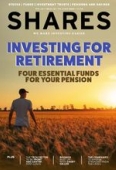Archived article
Please note that tax, investment, pension and ISA rules can change and the information and any views contained in this article may now be inaccurate.
Will the triple lock stay in place?

Can we really expect the Government to keep its pledge to increase the state pension in line with the triple lock following Covid-19?
Patrick
Tom Selby, AJ Bell Senior Analyst says:
While Covid-19 is clearly first-and-foremost a human tragedy, the costs of locking down vast swathes of the UK economy and paying up to 80% of the wages (and workplace pensions) of millions of people are astronomical.
The latest Office for Budget Responsibility (OBR) estimate suggests Government borrowing will hit £298bn in 2020/21 – a staggering £243bn higher than the figure published alongside March’s Budget (remember that).
This will place huge strain on Government finances, meaning we are likely to get yet another Budget either this year or early next as the Treasury reassesses its spending commitments. Among other pledges, the state pension triple lock is likely to come under the microscope.
WHAT IS THE STATE PENSION TRIPLE LOCK?
The triple lock was introduced in 2010 and increases the state pension in line with the highest of increases in average earnings, consumer prices index (CPI) inflation or 2.5%.
This guarantee only applies to the basic state pension (BSP), paid to those who reached state pension age before 6 April 2016, and the new state pension (NSP), paid to those who reach state pension age from 6 April 2016 onwards.
If you have any other state pension entitlements, such as state earnings-relate pensions (SERPS) or state second pension (S2P), these will rise each year in line with CPI inflation only.
For the 2020/21 tax year, the basic state pension is worth £134.25 a week (£6,981 per year) while the new state pension pays £175.20 a week (£9,110.40 per year).
WHAT DOES THE FUTURE HOLD?
Addressing MPs at during a Liaison Committee session on 27 May, prime minister Boris Johnson was asked specifically whether the triple lock would survive post-coronavirus. Replying he committed to stick to his manifesto promises – of which one is retaining the triple lock guarantee.
However, at the same time he refused to rule out increases in income tax, National Insurance or VAT – despite the manifesto expressly promising all three wouldn’t change during this Parliament.
Frankly, it would be bizarre if the prime minister felt genuinely able at this stage to stand by any of his party’s pre-election promises given the scale of the economic response and associated cost of tackling Covid-19.
The triple lock specifically could become very expensive to the Treasury if, as many predict, average earnings rebound significantly next year after dropping during 2020.
However, it is unlikely we will have clarity on this or many other tax and spend policies in the near future.
DO YOU HAVE A QUESTION ON RETIREMENT ISSUES?
Send an email to editorial@sharesmagazine.co.uk with the words ‘Retirement question’ in the subject line. We’ll do our best to respond in a future edition of Shares.
Please note, we only provide information and we do not provide financial advice. If you’re unsure please consult a suitably qualified financial adviser. We cannot comment on individual investment portfolios.
Important information:
These articles are provided by Shares magazine which is published by AJ Bell Media, a part of AJ Bell. Shares is not written by AJ Bell.
Shares is provided for your general information and use and is not a personal recommendation to invest. It is not intended to be relied upon by you in making or not making any investment decisions. The investments referred to in these articles will not be suitable for all investors. If in doubt please seek appropriate independent financial advice.
Investors acting on the information in these articles do so at their own risk and AJ Bell Media and its staff do not accept liability for losses suffered by investors as a result of their investment decisions.

 magazine
magazine








